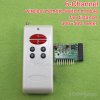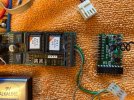Hello Fellow G Scale Enthusiasts!
I am trying to put together an inexpensive system to activate the horn and bells on my Phoenix Diesel Big Sound 97 board. A reed switch would work but I just want to activate the horn when I wish on my attic layout (I can run 5 trains at once on track power and being in a climate controlled attic is nice in hot, cold or inclement weather.) but I wanted enough range that if/when I have another garden railroad that I could still cover a fair sized back yard.
I purchased an inexpensive wireless set up with a hand held remote. A DC 5v 6-Channel Wireless Relay RF Switch Remote Control Switch Module Receiver off of eBay. It works well. The hand held controller uses a 12 volt battery and the receiver uses 5 volts. I tested the outputs and I am pleased with the remote and little receiver.
The Phoenix horn and bells can be activated by a Reed switch or simply by jumpering across from horn/bell output to ground. The Phoenix registers 5 volts output at the horn or bell output. The wireless receiver also has 5 volts at it's output. I think that I need a simple small 5 volt relay to go from the little receiver to allow the 5 volt circuit at the Phoenix Diesel Big Sound to activate. (To go between the Receiver and the Phoenix) I would like advice/a recommendation on what inexpensive relays (I figure that I need two, one for the horn and one for the bell.) that I can hopefully use. I will only be putting 5 volts through them and just need the relay to complete the circuit to allow the 5 volts on the Phoenix Big Sound to activate the horn or bell.
Please excuse my ignorance or lack of terminology of relays and these systems. I am trying to give as much information as I can to help out with any advice.
Thanks. Try to enjoy your Large Scale Trains today. AJ the teacher
I am trying to put together an inexpensive system to activate the horn and bells on my Phoenix Diesel Big Sound 97 board. A reed switch would work but I just want to activate the horn when I wish on my attic layout (I can run 5 trains at once on track power and being in a climate controlled attic is nice in hot, cold or inclement weather.) but I wanted enough range that if/when I have another garden railroad that I could still cover a fair sized back yard.
I purchased an inexpensive wireless set up with a hand held remote. A DC 5v 6-Channel Wireless Relay RF Switch Remote Control Switch Module Receiver off of eBay. It works well. The hand held controller uses a 12 volt battery and the receiver uses 5 volts. I tested the outputs and I am pleased with the remote and little receiver.
The Phoenix horn and bells can be activated by a Reed switch or simply by jumpering across from horn/bell output to ground. The Phoenix registers 5 volts output at the horn or bell output. The wireless receiver also has 5 volts at it's output. I think that I need a simple small 5 volt relay to go from the little receiver to allow the 5 volt circuit at the Phoenix Diesel Big Sound to activate. (To go between the Receiver and the Phoenix) I would like advice/a recommendation on what inexpensive relays (I figure that I need two, one for the horn and one for the bell.) that I can hopefully use. I will only be putting 5 volts through them and just need the relay to complete the circuit to allow the 5 volts on the Phoenix Big Sound to activate the horn or bell.
Please excuse my ignorance or lack of terminology of relays and these systems. I am trying to give as much information as I can to help out with any advice.
Thanks. Try to enjoy your Large Scale Trains today. AJ the teacher




